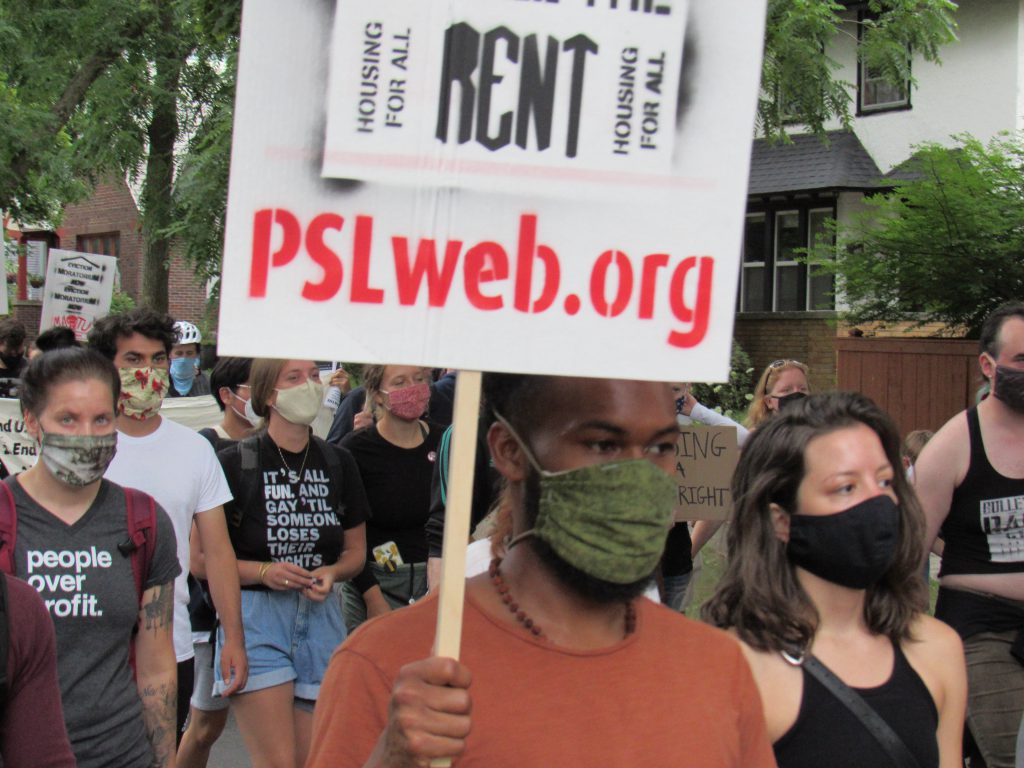Eviction Moratorium Is Short-Term Relief
New measure does not forgive rent or late fees. Advocates call for more help.

Protesters gather for an eviction march on Mayor Tom Barrett’s house in early August. Photo by Isiah Holmes/Wisconsin Examiner.
A temporary nationwide moratorium on evictions offers some hope for renters desperate to avoid losing their homes, but more comprehensive, longer-term solutions are still needed, according to tenant advocates.
On Tuesday, Treasury Secretary Steven Mnuchin disclosed during a congressional hearing that the agency order blocking evictions would be issued. The order, which comes from the Centers for Disease Control and Prevention (CDC), part of the Department of Health and Human Services, runs through Dec. 31. The order states an eviction ban will help ensure that people with COVID-19, or those who might be exposed to it, will be more easily able to isolate themselves to help curb the spread of the virus.
Renters with incomes of up to $99,000 for single people and $198,000 for couples filing jointly are eligible under the order, which is to be published on Friday, Sept. 4, and take effect immediately.
To avoid eviction under the order, tenants must sign a declaration that they have “used best efforts” to arrange for rental assistance and that they are “using best efforts” to make at least partial rent payments on time.
Community Advocates has posted a copy of the declaration form for download, and also has posted a downloadable Frequently Asked Questions document that includes the declaration form.
Tenants can still be evicted for criminal activity in their home, threatening other residents, damaging property or posing an immediate and significant risk of doing so, violating a building code, health ordinance or other health and safety regulations, or breaking any contract terms with the landlord besides late payments.
“The moratorium does not forgive rent or prevent late fees; tenants are still required to pay their rent as usual to prevent an eviction after the moratorium expires, even if they have lost income due to COVID-19,” according to Community Advocates.
“This new eviction moratorium is a helpful step for tenants facing evictions, but it’s an incomplete policy approach,” said Mike Bare, who leads the Healthy Housing Initiative at the Community Advocates Public Policy Institute. “Most federal assistance programs, both congressional and via executive actions, are set to expire by the end of the year. This assistance has proven effective at helping to prevent evictions and housing insecurity after the state’s eviction moratorium ended.
“Lawmakers could help to prevent people from struggling with housing insecurity by making more assistance available for a longer period of time,” Bare added.
Community Advocates has asked members of the Wisconsin congressional delegation to support aid to states, local government and school districts that would replace lost revenue and help fund essential services, and for more funds to help people who are homeless or whose housing is insecure.
The Community Advocates Rental Housing Resource Center includes information on rental assistance programs in Milwaukee. The agency provides a Rent Helpline at (414) 270-4646 or by email at renthelp@communityadvocates.net. It also provides links to services for mediation and for people who are homeless.
Wisconsin has posted pages on statewide resources for rental assistance.
The pending CDC moratorium replaces another federal moratorium under the CARES Act, the coronavirus relief bill passed in late March. The new eviction ban will be more sweeping than the CARES Act moratorium, which expired at the end of July and only applied to federally funded housing.
Allison Stevens of the States Newsroom Washington bureau contributed to this report.
Reprinted with permission of Wisconsin Examiner.
More about the Coronavirus Pandemic
- Governors Tony Evers, JB Pritzker, Tim Walz, and Gretchen Whitmer Issue a Joint Statement Concerning Reports that Donald Trump Gave Russian Dictator Putin American COVID-19 Supplies - Gov. Tony Evers - Oct 11th, 2024
- MHD Release: Milwaukee Health Department Launches COVID-19 Wastewater Testing Dashboard - City of Milwaukee Health Department - Jan 23rd, 2024
- Milwaukee County Announces New Policies Related to COVID-19 Pandemic - David Crowley - May 9th, 2023
- DHS Details End of Emergency COVID-19 Response - Wisconsin Department of Health Services - Apr 26th, 2023
- Milwaukee Health Department Announces Upcoming Changes to COVID-19 Services - City of Milwaukee Health Department - Mar 17th, 2023
- Fitzgerald Applauds Passage of COVID-19 Origin Act - U.S. Rep. Scott Fitzgerald - Mar 10th, 2023
- DHS Expands Free COVID-19 Testing Program - Wisconsin Department of Health Services - Feb 10th, 2023
- MKE County: COVID-19 Hospitalizations Rising - Graham Kilmer - Jan 16th, 2023
- Not Enough Getting Bivalent Booster Shots, State Health Officials Warn - Gaby Vinick - Dec 26th, 2022
- Nearly All Wisconsinites Age 6 Months and Older Now Eligible for Updated COVID-19 Vaccine - Wisconsin Department of Health Services - Dec 15th, 2022
Read more about Coronavirus Pandemic here






















Moratoriums are short term efforts that kick the can down the road. The longer term solution is federal or local housing vouchers or guaranteed minimum income. If our federal government doesn’t do this, then it is incumbent on the local officials to act now.